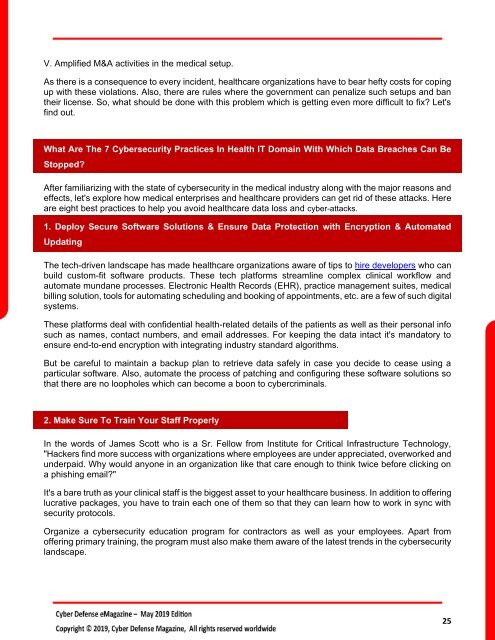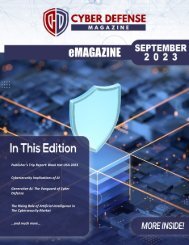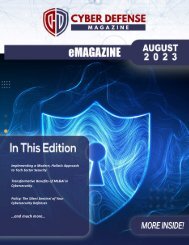Cyber Defense eMagazine May 2019
Cyber Defense eMagazine May Edition for 2019 #CDM #CYBERDEFENSEMAG @CyberDefenseMag by @Miliefsky a world-renowned cybersecurity expert and the Publisher of Cyber Defense Magazine as part of the Cyber Defense Media Group
Cyber Defense eMagazine May Edition for 2019 #CDM #CYBERDEFENSEMAG @CyberDefenseMag by @Miliefsky a world-renowned cybersecurity expert and the Publisher of Cyber Defense Magazine as part of the Cyber Defense Media Group
Create successful ePaper yourself
Turn your PDF publications into a flip-book with our unique Google optimized e-Paper software.
V. Amplified M&A activities in the medical setup.<br />
As there is a consequence to every incident, healthcare organizations have to bear hefty costs for coping<br />
up with these violations. Also, there are rules where the government can penalize such setups and ban<br />
their license. So, what should be done with this problem which is getting even more difficult to fix? Let's<br />
find out.<br />
What Are The 7 <strong>Cyber</strong>security Practices In Health IT Domain With Which Data Breaches Can Be<br />
Stopped?<br />
After familiarizing with the state of cybersecurity in the medical industry along with the major reasons and<br />
effects, let's explore how medical enterprises and healthcare providers can get rid of these attacks. Here<br />
are eight best practices to help you avoid healthcare data loss and cyber-attacks.<br />
1. Deploy Secure Software Solutions & Ensure Data Protection with Encryption & Automated<br />
Updating<br />
The tech-driven landscape has made healthcare organizations aware of tips to hire developers who can<br />
build custom-fit software products. These tech platforms streamline complex clinical workflow and<br />
automate mundane processes. Electronic Health Records (EHR), practice management suites, medical<br />
billing solution, tools for automating scheduling and booking of appointments, etc. are a few of such digital<br />
systems.<br />
These platforms deal with confidential health-related details of the patients as well as their personal info<br />
such as names, contact numbers, and email addresses. For keeping the data intact it's mandatory to<br />
ensure end-to-end encryption with integrating industry standard algorithms.<br />
But be careful to maintain a backup plan to retrieve data safely in case you decide to cease using a<br />
particular software. Also, automate the process of patching and configuring these software solutions so<br />
that there are no loopholes which can become a boon to cybercriminals.<br />
2. Make Sure To Train Your Staff Properly<br />
In the words of James Scott who is a Sr. Fellow from Institute for Critical Infrastructure Technology,<br />
"Hackers find more success with organizations where employees are under appreciated, overworked and<br />
underpaid. Why would anyone in an organization like that care enough to think twice before clicking on<br />
a phishing email?"<br />
It's a bare truth as your clinical staff is the biggest asset to your healthcare business. In addition to offering<br />
lucrative packages, you have to train each one of them so that they can learn how to work in sync with<br />
security protocols.<br />
Organize a cybersecurity education program for contractors as well as your employees. Apart from<br />
offering primary training, the program must also make them aware of the latest trends in the cybersecurity<br />
landscape.<br />
25


















